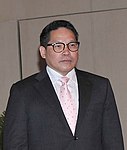2022 Thai presidential election: Difference between revisions
No edit summary |
No edit summary |
||
| Line 178: | Line 178: | ||
Upon its establishment, the office of [[President of Thailand|president]] was determined to be an indirectly elected position with members of the {{wp|National Assembly (Thailand)|National Assembly}} electing the president rather than the general populace. In this, three major candidates were nominated, namely {{wp|Yingluck Shinawatra}} of the {{wp|Pheu Thai Party}}, {{wp|Pita Limjaroenrat}} of the {{wp|Move Forward Party}}, and {{wp|Uttama Savanayana}} of the {{wp|Palang Pracharath Party}}. In the end, {{wp|Pheu Thai Party}}'s {{wp|Yingluck Shinawatra}}, formerly the {{wp|Prime Minister of Thailand|prime minister}} from 2011 to 2014 prior to being ousted in a {{wp|2014 Thai coup d'état|military coup}}, was elected as the country's first [[President of Thailand|president]], having garnered 510 out of the total 750 votes or roughly 68%, followed by {{wp|Move Forward Party}}'s {{wp|Pita Limjaroenrat}} with 180 votes or 24%, and {{wp|Palang Pracharath Party}}'s {{wp|Uttama Savanayana}} with 60 votes or 8%. | Upon its establishment, the office of [[President of Thailand|president]] was determined to be an indirectly elected position with members of the {{wp|National Assembly (Thailand)|National Assembly}} electing the president rather than the general populace. In this, three major candidates were nominated, namely {{wp|Yingluck Shinawatra}} of the {{wp|Pheu Thai Party}}, {{wp|Pita Limjaroenrat}} of the {{wp|Move Forward Party}}, and {{wp|Uttama Savanayana}} of the {{wp|Palang Pracharath Party}}. In the end, {{wp|Pheu Thai Party}}'s {{wp|Yingluck Shinawatra}}, formerly the {{wp|Prime Minister of Thailand|prime minister}} from 2011 to 2014 prior to being ousted in a {{wp|2014 Thai coup d'état|military coup}}, was elected as the country's first [[President of Thailand|president]], having garnered 510 out of the total 750 votes or roughly 68%, followed by {{wp|Move Forward Party}}'s {{wp|Pita Limjaroenrat}} with 180 votes or 24%, and {{wp|Palang Pracharath Party}}'s {{wp|Uttama Savanayana}} with 60 votes or 8%. | ||
Having previously served as the country's first female {{wp|Prime Minister of Thailand|prime minister}}, with her election, {{wp|Yingluck Shinawatra}} also became the first woman to assume the country's presidency. Meanwhile, the runner-up {{wp|Pita Limjaroenrat}} was later elected as the country's {{wp|Prime Minister of Thailand|prime minister}} in the {{wp|2023 Thai general election|general election}} the following year | Having previously served as the country's first female {{wp|Prime Minister of Thailand|prime minister}}, with her election, {{wp|Yingluck Shinawatra}} also became the first woman to assume the country's presidency. Meanwhile, the runner-up {{wp|Pita Limjaroenrat}} was later elected as the country's {{wp|Prime Minister of Thailand|prime minister}} in the {{wp|2023 Thai general election|general election}} the following year together with {{wp|Paetongtarn Shinawatra}} of the {{wp|Pheu Thai Party}} as {{wp|Deputy Prime Minister of Thailand|deputy prime minister}}, the latter being the daughter of former prime minister {{wp|Thaksin Shinawatra}} and niece of current president {{wp|Yingluck Shinawatra}}. | ||
Revision as of 16:17, 14 February 2024
| |||||||||||||||||
750 votes of the National Assembly 376 votes needed to win | |||||||||||||||||
|---|---|---|---|---|---|---|---|---|---|---|---|---|---|---|---|---|---|
| |||||||||||||||||
 | |||||||||||||||||
| |||||||||||||||||
The 2022 Thai presidential election was held in Bangkok on 20 February 2022. Held ten days after the aftermath of the 2022 Thai Revolution which abolished the Thai monarchy, the election is the first of its kind following Thailand's transition from a constitutional monarchy to a parliamentary republic.
Upon its establishment, the office of president was determined to be an indirectly elected position with members of the National Assembly electing the president rather than the general populace. In this, three major candidates were nominated, namely Yingluck Shinawatra of the Pheu Thai Party, Pita Limjaroenrat of the Move Forward Party, and Uttama Savanayana of the Palang Pracharath Party. In the end, Pheu Thai Party's Yingluck Shinawatra, formerly the prime minister from 2011 to 2014 prior to being ousted in a military coup, was elected as the country's first president, having garnered 510 out of the total 750 votes or roughly 68%, followed by Move Forward Party's Pita Limjaroenrat with 180 votes or 24%, and Palang Pracharath Party's Uttama Savanayana with 60 votes or 8%.
Having previously served as the country's first female prime minister, with her election, Yingluck Shinawatra also became the first woman to assume the country's presidency. Meanwhile, the runner-up Pita Limjaroenrat was later elected as the country's prime minister in the general election the following year together with Paetongtarn Shinawatra of the Pheu Thai Party as deputy prime minister, the latter being the daughter of former prime minister Thaksin Shinawatra and niece of current president Yingluck Shinawatra.


